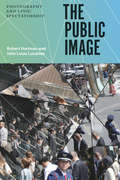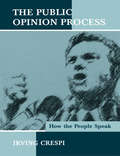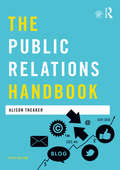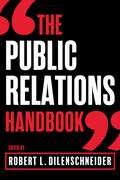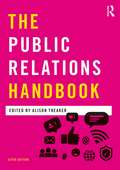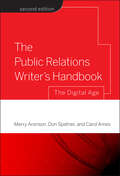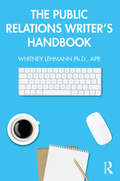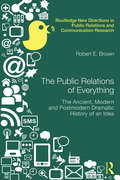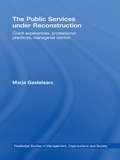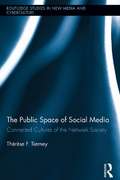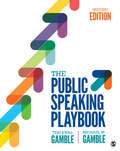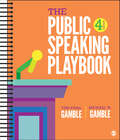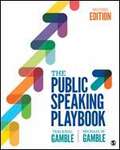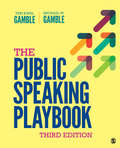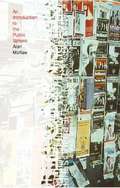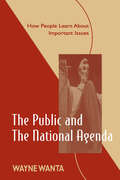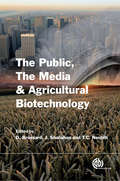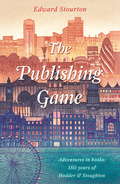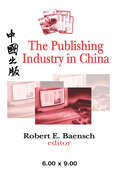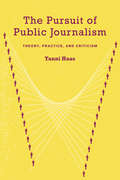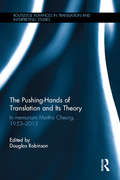- Table View
- List View
The Public Image: Photography and Civic Spectatorship
by Robert Hariman John Louis LucaitesEven as the media environment has changed dramatically in recent years, one thing at least remains true: photographs are everywhere. From professional news photos to smartphone selfies, images have become part of the fabric of modern life. And that may be the problem. Even as photography bears witness, it provokes anxieties about fraudulent representation; even as it evokes compassion, it prompts anxieties about excessive exposure. Parents and pundits alike worry about the unprecedented media saturation that transforms society into an image world. And yet a great news photo can still stop us in our tracks, and the ever-expanding photographic archive documents an era of continuous change. By confronting these conflicted reactions to photography, Robert Hariman and John Louis Lucaites make the case for a fundamental shift in understanding photography and public culture. In place of suspicions about the medium’s capacity for distraction, deception, and manipulation, they suggest how it can provide resources for democratic communication and thoughtful reflection about contemporary social problems. The key to living well in the image world is to unlock photography from viewing habits that inhibit robust civic spectatorship. Through insightful interpretations of dozens of news images, The Public Image reveals how the artistry of the still image can inform, challenge, and guide reflection regarding endemic violence, environmental degradation, income inequity, and other chronic problems that will define the twenty-first century. By shifting from conventional suspicions to a renewed encounter with the image, we are challenged to see more deeply on behalf of a richer life for all, and to acknowledge our obligations as spectators who are, crucially, also citizens.
The Public Opinion Process: How the People Speak (Routledge Communication Series)
by Irving CrespiWhat is public opinion? How can we best study it? This work presents a "process model" that answers these questions by defining public opinion in a way that also identifies an approach to studying it. The model serves as a framework into which the findings of empirical research are integrated, producing a comprehensive understanding of public opinion that encompasses the congeries of middle-range theories that have emerged from empirical research. The three-dimensional process model--and the way it is explicated--satisfies the diverse and sometimes divergent needs and interests of political scientists, sociologists, social psychologists, and communication specialists who study public opinion. This is achieved by clearly differentiating and interrelating the following: * individual opinions--the judgmental outcomes of a process in which attitudinal systems--comprised of beliefs, values/interests, and feelings--function as intervening variables that direct and structure perceptions of public issues; * collective opinions--the outcomes of communication from which mutual awareness emerges and that integrate separate individual opinions into a significant social force; and * political roles of collective and individual opinions--the outcomes of the extent to which collective and individual opinions have achieved legitimacy as the basis for governing a people. DON'T USE THIS PARAGRAPH FOR GENERAL CATALOGS... Each dimension of the model has its corresponding subprocess: transactions between individuals and their environments, communications among individuals and collectives, and political legitimation of public opinion. Since the process model is -- by definition -- interactional, none of the three dimensions has theoretical or sequential priority over the others. Instead of treating the psychological, political, and sociological aspects of public opinion as separate stages of an unidirectional process, the three aspects are modeled as dimensions of a complex, ongoing system in continuous interaction with each other. This conceptualization satisfies the need for a truly interdisciplinary theory in that it demands that each dimension be studied in terms of its defining sub-process. It also avoids the twin errors of reductionism and reification in the study of public opinion.
The Public Relations Handbook
by Alison TheakerThe Public Relations Handbook, Fifth Edition provides an engaging overview and in-depth exploration of a dynamic and ever evolving industry. The diverse chapters are united by a set of student friendly features throughout, including clear chapter aims, analytical discussion questions, and key further reading. Featuring wide ranging contributions from key figures in the PR profession, the new edition presents a new chapter on public relations and activism, alongside discussion of key critical themes in public relations research and exploratory case studies on public relations practices in relation to a variety of different institutions, including The Bank of Scotland, Queen Margaret University, Diabetes UK, Continental Tyres, and Action for Children. Split into four parts exploring key conceptual themes of the context of public relations, strategic public relations, stakeholder public relations, and shaping the future, the book offers coverage of essential areas including: public relations, politics and the media media relations in the social media age using new technology effectively in public relations public relations and engagement in the not-for-profit sector business-to-business public relations the public relations of globalisation.
The Public Relations Handbook
by Robert L. DilenschneiderTo be a successful public relations professional, it&’s no longer enough to be great at writing press releases and establishing media contacts. You must also expertly navigate the digital world and be prepared to dovetail your skills with those of other professionals. The Public Relations Handbook is a comprehensive and invaluable guide for public relations practitioners in the 2020s and beyond, covering the multitude of skills needed in the current environment, including: Supporting a company&’s marketing and sales Leveraging social media Managing government relations Working with the media effectively Communicating with the investment community Supporting top management in the event of a crisis or scandal Positively positioning the company&’s commitment to environmental, social, and governance issues The Public Relations Handbook has been an indispensable guide for public relations professionals since the first edition was published in 1967. This new fifth edition explains how to navigate a far more complex and constantly changing digital world while facing new challenges in financial, economic, political, public health, and societal issues. Editor Robert L. Dilenschneider is a communications executive who has called on leading practitioners in the field to address the specific skill sets, strategies, and execution that public relations practitioners need today. The scope of public relations is always expanding. Today&’s professionals must be prepared to deal with a wide variety of people, issues, and topics. The Public Relations Handbook will help all practitioners in the field advance their personal growth, success and careers.
The Public Relations Handbook (Media Practice)
by Alison TheakerThe Public Relations Handbook, 6th edition provides an engaging, in-depth exploration of the dynamic and ever-evolving public relations industry. Split into four parts exploring key conceptual themes in public relations, the book offers an overview of topics including strategic public relations, politics and the media; media relations in the social media age; strategic communication management; public relations engagement in the not-for-profit sector; activism and public relations; and the effects of globalisation and technology on the field. Featuring wide-ranging contributions from key figures in the PR profession, this new edition presents fresh views on corporate social responsibility, public relations and politics, corporate communication, globalisation, not-for-profit, financial and public sector public relations. The book also includes a discussion of key critical themes in public relations research and exploratory case studies of PR strategies in a variety of institutions, including Extinction Rebellion, Queen Margaret University, Mettis Aerospace, and Battersea Cats’ and Dogs’ Home. Containing student-friendly features including clear chapter aims, analytical discussion questions, and key further reading throughout the text, The Public Relations Handbook is an ideal resource for students of public relations, corporate and strategic communications, and media studies.
The Public Relations Writer's Handbook: The Digital Age
by Merry Aronson Don Spetner Carol AmesThe second edition of the Public RelationsWriters Handbook offers a simple, step-by-step approach to creating a wide range of writing, from basic news releases, pitch letters, biographies, and media alerts, to more complex and sophisticated speeches, media campaign proposals, crisis responses, and in-house publications. In addition, the thoroughly expanded and updated second edition shows how to keep up with the best practices of the public relations profession, as well as with the speed made possible and required by the digital age.
The Public Relations Writer’s Handbook
by Whitney LehmannFrom pitches and press releases to news and feature stories to social media writing and more, this new book by author Whitney Lehmann and a handful of experienced contributors breaks down the most widely used types of public relations writing needed to become a PR pro. The Public Relations Writer&’s Handbook serves as a guide for those both in the classroom and in the field who want to learn, and master, the style and techniques of public relations writing. Eighteen conversational chapters provide an overview of the most popular forms of public relations writing, focusing on media relations, storytelling, writing for the web/social media, business and executive communications, event planning and more. Chapters include user-friendly writing templates, exercises and AP Style skill drills and training. Whether you&’re a PR major or PR practitioner, this book is for you. Lehmann has combined her industry and classroom experience to create a handbook that&’s accessible for PR students and practitioners alike. A dedicated eResource also supports the book, with writing templates and answer keys (for instructors) to the end-of-chapter exercises in the text. www.routledge.com/9780815365280.
The Public Relations of Everything: The Ancient, Modern and Postmodern Dramatic History of an Idea (Routledge New Directions in PR & Communication Research)
by Robert E. BrownThe public relations of "everything" takes the radical position that public relations is a profoundly different creature than a generation of its scholars and teachers have portrayed it. Today, it is clearly no longer limited, if it ever has been, to the management of communication in and between organizations. Rather, it has become an activity engaged in by everyone, and for the most basic human reasons: as an act of self-creation, self-expression, and self-protection. The book challenges both popular dismissals and ill-informed repudiations of public relations, as well as academic and classroom misconceptions. In the age of digitization and social media, everyone with a smart phone, Twitter and Facebook accounts, and the will and skill to use them, is in the media. The PR of everything – the ubiquitousness of public relations – takes a perspective that is less concerned with ideas of communication and information than with experience and drama, a way of looking at public relations inside out, upside down and from a micro rather than a macro level. Based on a combination of the research of PR practice and critical-thinking analysis of theory, and founded in the author’s extensive corporate experience, this book will be invaluable reading for scholars and practitioners alike in Public Relations, Communications and Social Media.
The Public Services under Reconstruction: Client experiences, professional practices, managerial control (Routledge Studies in Management, Organizations and Society)
by Marja GastelaarsThis book examines the services in and around the public domain. The author analyses a number of socio-cultural changes that are generally considered relevant to these services, including the rationalising efforts of the New Public Management and the introduction of IT. The book particularly addresses the diversity of services. It focuses on the local complexities of their day to day processes of service delivery, and on the diversity of client experiences and professional roles associated with various client relationships. A practical objective of this book is to encourage its readers to ‘redefine’ the services they professionally deal with, and move beyond the standard requirements of the New Public Management that are so often taken for granted as a starting point. Professional managers are, for instance, invited to reconsider their currently quite dominant ‘technical’ managerial perspective. Service professionals are encouraged to make sense of the risks and responsibilities involved with their day to day negotiations, including the impact of the services on the lives of their clients. Gastelaars adopts and interpretive approach to her subject, combining discourse analysis and ethnographic research to concentrate on the actual practices associated with service delivery, rather than on theories and justifications.
The Public Space of Social Media: Connected Cultures of the Network Society (Routledge Studies in New Media and Cyberculture)
by Therese TierneySocial media is restructuring urban practices–through ad-hoc experimentation, commercial software development, and communities of participation. This book is the first to consider how practices contained within social media are situated within a larger genealogy of public space, including theories of communal identity, civitas and democracy, the fete, and self-expression. Through empirical research, the actual social practices of participants of networked publics are described and analyzed. Documenting how online counterpublics use the Internet to transmit classified photos, mobilize activists, and challenge the status quo, Tierney argues that online activities do not stop in online conversations; they are physically grounded through mobile GPS coordinates which are then transformed into activities in physical space—the street, the plaza, the places where people have traditionally gathered to demonstrate and express their opinions publicly.
The Public Speaking Playbook
by Teri Kwal Gamble Michael W. GambleThe Public Speaking Playbook, Second Edition, shows students how to prepare, practice, and present their public speeches with the highest level of confidence. With a focus on actively building skills, Teri Kwal Gamble and Michael W. Gamble coach students in the fundamentals of the public speaking process, using brief interactive learning modules that allow students to practice—and improve—their public speaking. The highly anticipated Second Edition of this bestselling text features a more inclusive playbook analogy, exposing students to additional arenas—for example, politics, music, and business—to hone their skills and improve their performance. As students master the skills, they are also encouraged to think critically about what it means to “play fair” in public speaking, with a focus on diversity, ethics, and civic engagement.
The Public Speaking Playbook
by Teri Kwal Gamble Michael W. GambleThe Public Speaking Playbook, Second Edition, shows students how to prepare, practice, and present their public speeches with the highest level of confidence. With a focus on actively building skills, Teri Kwal Gamble and Michael W. Gamble coach students in the fundamentals of the public speaking process, using brief interactive learning modules that allow students to practice—and improve—their public speaking. The highly anticipated Second Edition of this bestselling text features a more inclusive playbook analogy, exposing students to additional arenas—for example, politics, music, and business—to hone their skills and improve their performance. As students master the skills, they are also encouraged to think critically about what it means to “play fair” in public speaking, with a focus on diversity, ethics, and civic engagement.
The Public Speaking Playbook
by Teri Kwal Gamble Michael W. GambleLearn to speak in public without breaking a sweat! The Public Speaking Playbook, Fourth Edition coaches students to prepare, practice, and present speeches at their highest level. With a focus on actively building skills, the Playbook guides students in the fundamentals of the public speaking process, and uses frequent interactive exercises that allow students to practice—and improve—their public speaking. Students want to put their skills into practice quickly, so the Playbook gives them the essentials in brief learning modules that focus on skill-building through independent and collaborative learning activities. As students master their skills, they are also encouraged to think critically about what it means to "play fair" in your public speaking—with a focus on diversity, ethics, and civic engagement.
The Public Speaking Playbook
by Teri Kwal Gamble Michael W. GambleLearn to speak in public without breaking a sweat! The Public Speaking Playbook, Fourth Edition coaches students to prepare, practice, and present speeches at their highest level. With a focus on actively building skills, the Playbook guides students in the fundamentals of the public speaking process, and uses frequent interactive exercises that allow students to practice—and improve—their public speaking. Students want to put their skills into practice quickly, so the Playbook gives them the essentials in brief learning modules that focus on skill-building through independent and collaborative learning activities. As students master their skills, they are also encouraged to think critically about what it means to "play fair" in your public speaking—with a focus on diversity, ethics, and civic engagement.
The Public Speaking Playbook (Second Edition)
by Teri Kwal Gamble Michael W. GambleHow exciting it is for us to have completed the second edition of The Public Speaking Playbook. We hope you find it even more engaging and useful than this text's first edition.
The Public Speaking Playbook: The Public Speaking Playbook 2e + Speechplanner
by Teri Kwal Gamble Michael W. GambleThe Public Speaking Playbook shows students how to prepare, practice, and present their public speeches with the highest level of confidence. With a focus on actively building skills, Teri Kwal Gamble and Michael W. Gamble coach students in the fundamentals of the public speaking process, using engaging learning modules that allow students to practice—and improve—their public speaking.
The Public Speaking Playbook: The Public Speaking Playbook 2e + Speechplanner
by Teri Kwal Gamble Michael W. GambleThe Public Speaking Playbook shows students how to prepare, practice, and present their public speeches with the highest level of confidence. With a focus on actively building skills, Teri Kwal Gamble and Michael W. Gamble coach students in the fundamentals of the public speaking process, using engaging learning modules that allow students to practice—and improve—their public speaking.
The Public Sphere: An Introduction
by Alan McKeeDrawing on many examples from contemporary media culture, Alan McKee looks at how we communicate with each other in public--and how we decide whether changing forms of communication are beneficial for the "public sphere". McKee's introduction to the concept of the public sphere, or free debate space, includes background history as well as philosophical arguments concerning its function.
The Public and the National Agenda: How People Learn About Important Issues
by Wayne WantaFocusing on the agenda-setting function of the news media from an information processing standpoint, this volume examines how individuals expose themselves to news media content and how this content translates into issue salience. It utilizes the individual as the unit of measurement. Many agenda-setting studies have used the issue, rather than the individual, as the unit of measurement. By employing an "agenda-setting susceptibility" index, the book details how individuals who actively process information in the news media are most susceptible to agenda-setting effects. Merging agenda-setting with research in information processing and uses and gratifications, it proposes and tests a causal model of media agenda-setting influences by examining demographics, psychological factors, and behavioral variables of individuals.
The Public, the Media and Agricultural Biotechnology
by Dominique Brossard James Shanahan T. Clint NesbittThis book reviews the literature on communication about biotechnology. However this book with the use of case studies looks at public opinion data, communication theory, and international examples; to provide a complementary overview of how the public sees this controversial topic.
The Publishing Game: Adventures in Books: 150 years of Hodder & Stoughton
by Edward StourtonAuthor, journalist and BBC presenter Ed Stourton delves into the Hodder & Stoughton archives to tell the human story of 150 years of publishing. From the day in June 1868 when Matthew Henry Hodder and Thomas Wilberforce Stoughton first founded the company, through numerous encounters with authors from John le Carre to Jodi Picoult, and several staff sports days - this will be an entertaining and enlightening read for any book lover.
The Publishing Game: Adventures in Books: 150 years of Hodder & Stoughton
by Edward StourtonAuthor, journalist and BBC presenter Ed Stourton delves into the Hodder & Stoughton archives to tell the human story of 150 years of publishing. From the day in June 1868 when Matthew Henry Hodder and Thomas Wilberforce Stoughton first founded the company, through numerous encounters with authors from John le Carre to Jodi Picoult, and several staff sports days - this will be an entertaining and enlightening read for any book lover.
The Publishing Industry in China
by AntonioThe Publishing Industry in China is a timely volume that covers all aspects of China's book, magazine, and online publishing industry. Various chapters discuss the different market segments of trade, scientific, technical, professional, education, and children's books.
The Pursuit of Public Journalism: Theory, Practice and Criticism
by Tanni HaasThe Pursuit of Public Journalism is an engaging introduction to the theoretical foundations and practices of the journalistic reform movement known as 'public journalism.' Public journalism - stated briefly - seeks to reinvest journalism with its fundamental responsibilities to democracy and public life. This book argues against many deeply ingrained practices ranging from journalistic detachment to framing stories via polar conflict in favor of greater civic involvement on the part of journalists. Tanni Haas traces the historical context in which public journalism emerged, develops a philosophy for public journalism, reviews empirical research on public journalism’s performance to date and responds to the major criticisms directed at public journalism. He also examines the particular challenges that public journalism poses to curriculum and instruction: how can journalism educators teach students to write stories useful and of concern to citizens, and how can they encourage citizens to publicly criticize news coverage of given topics? Following review of the major challenges and criticisms of public journalism, the author offers practical solutions for improving public journalism and speculates on public journalism’s likely future.
The Pushing-Hands of Translation and its Theory: In memoriam Martha Cheung, 1953-2013 (Routledge Advances in Translation and Interpreting Studies)
by Douglas RobinsonThis book presents an East-West dialogue of leading translation scholars responding to and developing Martha Cheung’s "pushing-hands" method of translation studies. Pushing-hands was an idea Martha began exploring in the last four years of her life, and only had time to publish at article length in 2012. The concept of pushing-hands suggests a promising line of inquiry into the problem of conflict in translation. Pushing-hands opens a new vista for translation scholars to understand and explain how to develop an awareness of non-confrontational, alternative ways to handle translation problems or problems related to translation activities that are likely to give rise to tension and conflict. The book is a timely contribution to celebrate Martha's work and also to move the conversation forward. Despite being somewhat tentative and experimental, it probes into how to enable and develop dynamic interaction between and reciprocal determinism of different hands involved in the process of translation.
